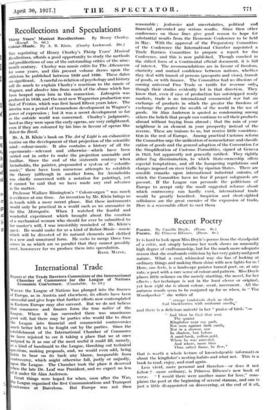Recollections and Speculations Thirty Years' Musical Recollections. By Henry Chorley.
(Knopf. is. 6d.) THE reprinting of Henry Chorley's Thirty Years' Musical Recollections, affords a good opportunity to study the methods
and predilections of one of the outstanding critics of the nine-
teenth century. Chorley was music critic. for The Athenaeum for some years, and this present volume draws upon the
criticism he published between 1830 and 1880. These dates are significant. A careful co-relation of psychology and history will do much to explain Chorley's reactions to the music of Wagner, and absolve him from much of the abuse which has
been heaped upon him in this connexion. Lohengrin was produced in 1850, and the next new Wagnerian production was that of Tristan, which was first heard fifteen years later. The interim was a period of tremendous development in Wagner's power of expression ; but it was a secret development so far as the outside world was concerned. Chorley's judgments, based as they were upon the early operas, are very enlightened, even if they are coloured by his bias in favour of operas like Robert the Devil.
Mr. A. B. Klein's book on The Art of Light is an exhaustive treatise on the development of that projection of the scientific mind—colour-music. It also contains a history of all the experiments—relevant and otherwise—which have been carried out in order to make the projection amenable and familiar. Since the end of the sixteenth century when Arcimboldo, the painter, propounded a system of " colorific mimic," there have been numerous attempts to . establish the theory (although in another form, for Areimboldo was chiefly concerned with a notation for painting), yet it cannot be said that we have made any real advance in the matter.
Professor Wallace Millington's " Colour-organ " was much in evidence at one time. An invention by Mr. Klein brings us in touch with a more recent phase. But these instruments would only be practical in a world such as we encounter in the film Metropolis. When I watched the fearful and wonderful experiment which brought about the creation of a mechanical woman who should for ever be submitted to her master's will, I was irresistibly reminded of Mr. Klein's quest He would make for us a kind of Robot-Music—music which will be divested of its natural elements and clothed in a new and unnatural form. He seeks to merge those two senses in us which are so parallel that they cannot possibly meet, howsoever far we produce them into speculation.
BASIL MAINE.










































 Previous page
Previous page